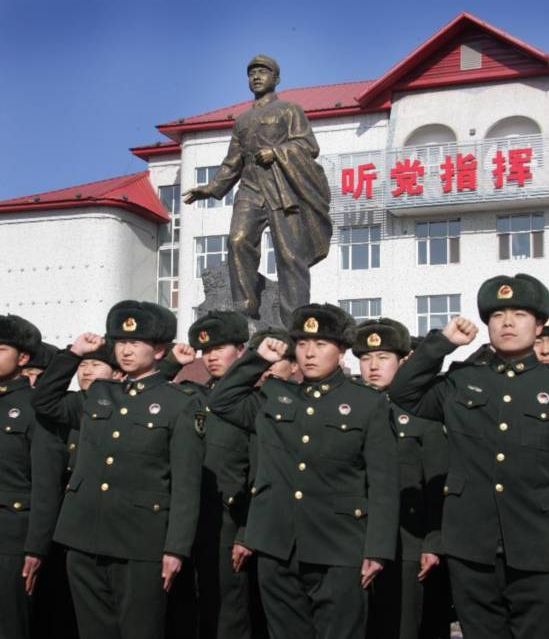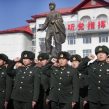
Another Lei Feng Revival: Making Maoism Safe for China
Publication: China Brief Volume: 12 Issue: 5
By:

Chinese political culture contains a lot of dangerous ideas for the Chinese Communist Party (CCP). This may go a long ways toward explaining Beijing’s fickle relationship with Confucius as a symbol of Chinese culture and, now, with the trappings of Maoism. While criticism of Chongqing’s “Singing Red Songs” (changhong) campaign highlights the growing disfavor of the city’s party secretary, Politburo member Bo Xilai, the CCP Propaganda Department announced on February 27—a week before National Lei Feng Day—the revival of a campaign to promote “the spirit of Lei Feng,” the selfless if obedient hero of the Chinese revolution (People’s Daily, February 28; China News Service, February 27). The campaign highlights the latest contradiction facing a Leninist party bereft of communist spirit, living on nationalist credentials gained through economic development and patriotic education. How does a governing party based on a foreign ideology find native symbols that encourage support for the regime that do not support the principle of regime change? The answer, as it has been since 1963, is once again Lei Feng.
The problem with once again dusting off the old hero is that Lei Feng may not be prepared for the modern age. Even online editors for the People’s Daily asked only a couple of years ago if learning from Lei Feng is outdated. The answer earlier this week, of course, was an emphatic “no” (Xinhua, February 29; People’s Daily, February 28; People’s Net, March 8, 2010). The Global Times also reposted an Internet witticism showing how little sticking power Lei Feng has, “the post-1970’s generation learned form Lei Feng, the post-1980’s generation revolted against Lei Feng, and the post-1990’s generation has forgotten about Lei Feng.” Repeated in other CCP-run papers, the words seem to indict widespread public cynicism about Beijing’s promotion of values.
Although the Propaganda Department announced the campaign on Monday, the campaign seems to have been in the works for some time. Last fall, the Sixth Plenum report—known for its focus on cultural issues—mentioned normalizing the study of Lei Feng, but only in passing (Xinhua, February 29; Guangming Daily, February 26). The China Media Project also tracked a steady and increasing stream of Lei Feng articles through February that peaked at the Propaganda Department’s announcement. The first real hint of a serious campaign came on February 23 when The Complete Works of Lei Feng was published in a massive 200,000 Chinese character-long anthology (Xinhua, February 23).
The campaign to normalize learning from Lei Feng’s activities contains a nine-fold approach, ranging from regular activities to major annual forums and from CCP cadres to schoolchildren. The Propaganda Department directed grassroots organs and cultural associations to produce Lei Feng pamphlets, television and radio programs, scholarly essays and more. Even CCP cadre are not immune, because they need to study Lei Feng to maintain their ideological purity to retain their vanguard status (People’s Daily, March 1, February 28; China News Service, February 27). The Ministry of Education also has directed Lei Feng-inspired activities be included in elementary and middle school curriculums as part of moral education (Xinhua, February 28). Apart from the moral considerations, Lei Feng also is being billed as a nationalist and a symbol of the spirit of the Chinese people.
The new Lei Feng campaign is a safer and more politically palatable version of Bo’s “singing red songs” effort—both in terms of factional politics and the CCP’s right to govern—which is a throwback to the days of Mao Zedong. On the former, the princeling Bo has tried to lead a neo-Maoist revival presumably to bolster his standing. “Singing red songs” joined Bo’s campaign against organized crime and corruption that may have threatened the political prospects of Hu Jintao ally, Guangdong party chief Wang Yang, who preceded Bo in Chongqing. Bo’s “success” in cleaning out Chongqing could be seen as tarnishing Wang for letting such corruption run free (“Bo Xilai’s Campaign for the Standing Committee and the Future of Chinese Politicking,” China Brief, November 11, 2011; “The CCP’s Disturbing Revival of Maoism,” China Brief, November 19, 2009). The dangers to Beijing of Bo’s invocation of China’s Maoist past however go beyond factional politics. Last year, one Chinese academic opined to the New York Times that the so-called “red songs” were really pink, because Mao’s revolutionary zeal to destroy established centers of power could not be found among Bo’s hymn selection (June 29, 2011). In other words, for every song proclaiming “Socialism is Good” there is a song declaring “It is Right to Rebel,” making the changhong campaign a slippery slope toward potentially rejecting the CCP’s legitimacy, or at least Hu’s vision of a “harmonious society.”
The same slippery slope also is present in state-run Confucianism, denying the CCP unrestricted use as last year’s placement and removal of a statue of Confucius on Tiananmen Square symbolized (Xinhua, January 12, 2011; Economic Observer [China], April 21, 2011). Outsiders have long misconstrued the emphasis of Confucian thinking with the tame state-run version, which emasculated Chinese society and justified state oppression. Although forms of filial piety in state-led Confucianism have been used to justify subordination to the government for hundreds of years, Confucius’ emphasis on virtue far outweighs obedience: “in the face of a wrong or unrighteousness, it is the duty of the son to oppose his father, and the duty of the servant to oppose his superior.” In an explicitly political context, Confucius was even more clear, pointing out “tyrannical government is more dangerous than man-eating tigers.” Mencius combined these ideas into the Mandate of Heaven, which justified rebellion against incompetent or malignant governments. He wrote “when a ruler treats his subjects like grass and dirt, then the subjects should treat him as a bandit and an enemy.” Mao, a thorough student of the power of principles, understood this, which is why he sought to destroy Confucianism as a Chinese challenger to the foreign-born Marxist-Leninist ideology he espoused. Due to Chinese disenchantment with foreign rule after the Qing Dynasty, Confucian thought in the hands of nationalists would have been dangerous to the revolution.
These points illustrate the precariousness of the CCP position in living off of nationalism while trying to generate new ways to promote social stability. Beijing has to use Chinese, rather than foreign, ideas; however, important and recognizable strands of political thought, Confucianism and Maoism, explicitly endorse rebellion. Lei Feng is at least obedient as a tame Maoist relic that the Propaganda Department can pitch as a symbol of the Chinese people (Xinhua, March 1; People’s Daily, February 27). The problem, however, is that few people are likely to live the “Lei Feng spirit” as such, because of mistrust of the government and widespread cynicism—a point even Chinese press concede. As Renmin University sociologist Zhou Xiaozheng said, “If the upper levels of society do not learn from Lei and become good examples to follow, how are the regular people supposed to be willing to?” (Global Times, February 23).





